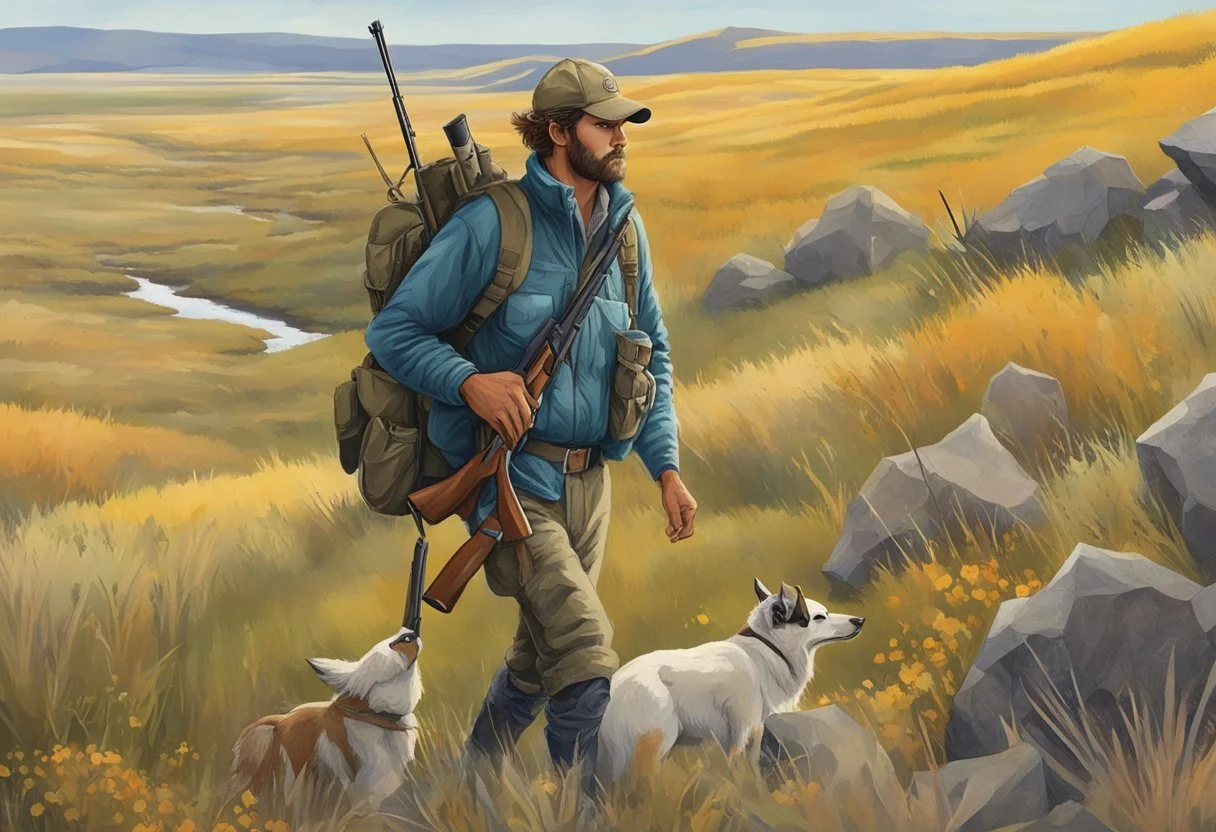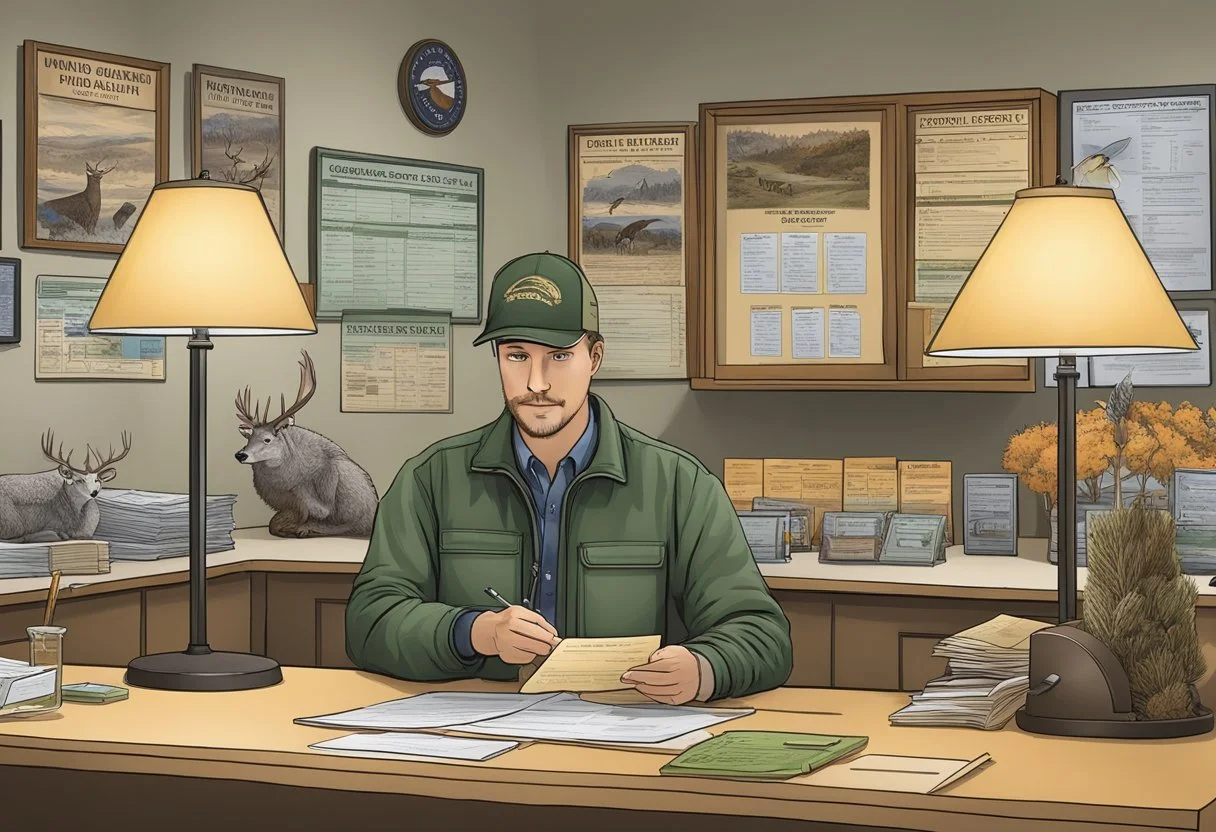How to Get a North Dakota Non-Resident Hunting License
A Guide to Acquiring Your Permit
This Article is Part of Our Guide to Non Resident Hunting Licenses by State
Non-resident hunters looking to immerse themselves in the natural beauty and hunting experiences offered by North Dakota must first navigate the state’s licensing requirements. The North Dakota Game and Fish Department regulates these licenses, ensuring all participants comply with local conservation laws and contribute to the management and upkeep of the state's wildlife. Non-residents are required to obtain a specific set of credentials before they can legally hunt in North Dakota, which includes a hunting license, a fishing, hunting, and furbearer certificate, and a general game and habitat license.
The process for non-residents to secure a hunting license mirrors that of residents but comes with higher fees. Among other prerequisites, individuals born after December 31, 1961, must have completed a hunter education course certified by a state or provincial agency to be eligible for a North Dakota hunting license. This stipulation promotes safety and understanding of ethical hunting practices among all who take part in the sport within state boundaries. Additional regulations, such as the mandatory wearing of orange clothing for big game hunters, are in place to further ensure the safety of all hunting participants.
North Dakota Hunting Overview
North Dakota offers a rich hunting heritage with diverse wildlife populations managed for sustainable use. The state takes pride in its conservation efforts, ensuring that habitats are preserved for future generations while providing hunting opportunities.
Understanding North Dakota's Hunting Heritage
North Dakota's hunting heritage is deeply rooted in the state's culture and economy. The state is renowned for its fair chase hunting and is committed to wildlife management and habitat conservation. Sportsmen from across the country are attracted by the state's robust populations of game birds and the various big game species.
General Game and Habitat
The General Game and Habitat License is a requirement for hunting in North Dakota. It serves as a foundation for conservation efforts, with the funds directly supporting wildlife management and habitat restoration. Hunters age 16 and older are required to have this license, with distinctive guidelines for resident and nonresident hunters.
Wildlife and Habitat Conservation Funding:
Resident: Infusion of funding through license sales
Nonresident: Contributions via licenses catered to short-term hunting visits
Wildlife Management Areas
North Dakota boasts numerous Wildlife Management Areas (WMAs), which are crucial for preserving the state's natural heritage. These areas provide vital habitat for game and non-game species alike and are accessible for outdoor enthusiasts, including hunters, to enjoy.
Habitat Preservation: Protection and improvement of various ecosystems
Hunting Access: Publicly available lands for hunters with appropriate licensing
WMAs Features:
Location: Strategically located across North Dakota
Biodiversity: Support a variety of species, including migratory birds and big game
Usage: Open to hunters during designated seasons, with specific regulations in place
By adhering to the General Game and Habitat License requirements and respecting WMAs, hunters in North Dakota play a significant role in conservation efforts, balancing the state's traditions with the need for sustainable wildlife management.
Non-Resident License Requirements
For non-residents seeking to hunt in North Dakota, specific requirements must be met to obtain the necessary licenses. These include proof of identity and residency, completion of a hunter education course, and adherence to eligibility criteria.
Identification and Residency
Non-residents must provide a valid form of identification to purchase a hunting license. The acceptable forms typically include a state-issued driver's license or identification card that establishes the individual is not a resident of North Dakota.
Hunter Education Certification
Individuals born after December 31, 1961, are required to complete a state or provincial hunter education course. Proof of certification must be submitted when applying for a hunting license. This rule applies to anyone seeking a hunting license, with the exception of those hunting solely on their own property.
Required Course: State or provincial hunter education
Age Restriction: Born after December 31, 1961
Exceptions: Landowner exemption
Eligibility and Restrictions
Non-residents must meet eligibility requirements and understand the restrictions for hunting licenses. For example, non-residents may need to purchase additional specific licenses such as the Nonresident Waterfowl License when hunting migratory waterfowl.
License Types: General hunting, specific game, migratory waterfowl
Additional Certificates: Fishing, Hunting, Furbearer Certificate may be required
Age Considerations: Some licenses have age-related specifications
Licensing Process for Non-Residents
Non-residents looking to engage in hunting in North Dakota need to obtain the proper licenses, which can be purchased through authorized channels and are subject to certain deadlines, especially for lotteries governing limited tags.
Where to Purchase Licenses
Non-residents can purchase hunting licenses directly from the North Dakota Game and Fish Department or through authorized license vendors. Licenses are also available for purchase online via the department's website, providing a convenient option for hunters to secure the necessary documentation. Paperwork required may include a Fishing, Hunting, Furbearer Certificate and proof of completion of a hunter safety course, depending on the individual's age and the species they intend to hunt.
Lottery and Application Deadlines
Licenses for some species are in high demand and are therefore allocated through a lottery system. The department conducts these lotteries for species such as bighorn sheep, elk, moose, pronghorn, tundra swan, turkey, and both white-tailed and mule deer. Non-residents must adhere to the application deadlines to be considered for these lotteries. Deadlines are typically announced on the North Dakota Game and Fish Department's website well in advance of the hunting seasons. It is critical for applicants to submit their entries before the deadlines to avoid missing the opportunity to receive a license through the lottery.
Type of Non-Resident Licenses
Non-residents interested in hunting in North Dakota have a variety of specialized licenses to choose from, whether they aim to pursue small game, engage in waterfowl hunting, or seek the thrill of big game. Each license category is designed to meet the distinct regulations and requirements for the game being hunted.
Small Game and Upland Licenses
These licenses are geared toward non-residents who wish to hunt species classified under small game, which typically includes upland birds. This license allows individuals to participate in hunting activities within the regulatory frameworks established for these species.
Big Game and Waterfowl Licenses
Big game hunting in North Dakota encompasses several types of licenses, each specific to the animal being hunted, such as deer, bighorn sheep, elk, moose, pronghorn, and turkey. These licenses are often distributed through a lottery system due to high demand and limited availability. For hunters interested in waterfowl, there are dedicated licenses for species such as ducks and geese, which are essential for lawful and regulated hunting of these migratory birds.
Combination and Special Licenses
Combination licenses may include options that allow non-resident hunters to pursue both small and big game, or small game and fishing. Special licenses, like the nonresident any-deer bow license, allow limited access, often through a quota system, to certain species and hunting methods. These combination and special licenses offer a diverse hunting experience for non-resident hunters visiting North Dakota.
Regulations and Seasons
In North Dakota, hunting regulations are established to ensure sustainable wildlife populations and fair chase principles. Each hunting season has specific dates and bag limits for various game species, which are critical to understanding before planning a hunt.
General Hunting Regulations
Regulations mandate that all hunters, regardless of age, register through the Harvest Information Program (HIP) for each state where they hunt ducks, geese, swans, mergansers, coots, cranes, snipe, doves, and woodcock. HIP registration is free and an essential step to comply with wildlife conservation and management efforts.
Residency: Non-residents must have appropriate licenses.
License Exemptions: Residents hunting on their lands do not need a license for small game.
Federal Waterfowl Stamp: Hunters 16 years or older require this stamp to hunt certain waterfowl.
Specific Season Dates and Bag Limits
North Dakota possesses distinct season dates for deer, turkey, and other game. Each season is regulated with set dates and specific bag limits, which are enforced to maintain ecological balance and preserve wildlife resources.
Deer: Specific dates vary each year; hunters should verify the calendar annually.
Turkey: Seasonal dates and bag limits are published by the North Dakota Game and Fish Department.
Bag Limits are crucial for each hunter's awareness and adherence:
Waterfowl: Include ducks, geese, and swans, with limits individualized per species.
Upland Game: Such as pheasant, have daily and possession limits.
Unprotected and Nongame Opportunities
Unprotected and nongame species in North Dakota offer additional hunting opportunities outside of the typical game seasons. Hunters should note there is no nongame license requirement, but they must still follow other regulations.
Unprotected Species: These can be hunted without a license, but within seasons and regulations.
Nongame Hunting: Includes species not classified as game and may not have set bag limits.
Hunting Education and Safety
In North Dakota, hunters are required to meet specific education standards and adhere to safe hunting practices. This ensures that all hunters are well-prepared and informed about the responsibilities that come with the sport.
Hunter Education Requirements
North Dakota mandates that individuals must complete a hunter education course if they were born after December 31, 1961, and are at least 12 years old within the calendar year. The course covers essential topics such as wildlife conservation, hunting laws, and safe firearms handling. Proof of completion of such a course is necessary to obtain a hunting license.
Minimum age: 12 within the calendar year
Residency: No requirement to be a North Dakota resident
Proof of completion: Required for hunting license purchase
Safe Hunting Practices
The state of North Dakota places a high priority on safety, especially regarding the handling of firearms and the act of hunting itself. Safe hunting practices are not only included as part of the hunter education curriculum but are also expected to be upheld in the field.
Firearm safety: Always assume every firearm is loaded; never point a firearm at anything you do not intend to shoot.
Direct supervision: Hunters under 16 are required to be under the direct supervision of a licensed adult hunter.
Awareness: Stay aware of your surroundings and maintain a safe distance between other hunters.
These measures are crucial for preventing accidents and ensuring that hunting remains a safe activity for everyone involved.
Conservation and Habitat Protection
In North Dakota, non-resident hunters are integral to conservation efforts and habitat protection. Their participation aids in the management and funding of wildlife habitats.
Habitat Licenses and Conservation Practices
Habitat licenses, such as the General Game and Habitat License, are mandatory for all hunters except for those seeking furbearer licenses. These licenses serve a dual purpose: allowing individuals to hunt while simultaneously contributing to conservation initiatives. The funds generated from these licenses are directed towards the maintenance and improvement of habitats, ensuring sustainable wildlife populations.
Funds allocation:
Wildlife Management Areas (WMAs): Development and upkeep
Habitat restoration projects
Conservation education programs
These practices aim to balance the ecosystem and preserve the land for future generations.
Contribution to North Dakota's Ecology
Non-resident hunters contribute significantly to North Dakota's ecology through their purchase of habitat licenses. The state uses these funds to implement effective wildlife management strategies, which are critical for maintaining diverse and thriving animal populations.
Impactful contributions include:
Establishing and enhancing habitats
Protecting endangered species
Funding research on wildlife management and conservation methods
Every non-resident license purchased is a step towards preserving North Dakota's natural heritage for future enjoyment and ecological balance.
Additional Considerations for Non-Residents
When non-residents plan to hunt in North Dakota, they must be aware of certain rules and available resources distinct from resident hunters. These considerations are particularly important for military personnel stationed outside the state and students attending school in North Dakota from elsewhere.
Military Personnel and Non-Resident Students
Non-residents who are members of the United States Armed Forces and are stationed outside North Dakota still have the opportunity to procure hunting licenses as if they were residents, provided they can show proof of North Dakota residency. This proof might include a driver’s license number or a non-driver photo ID number from North Dakota. The appropriate licensing fees must still be paid by military personnel to access this benefit.
For non-resident students studying in North Dakota educational institutions, similar provisions may apply. They should check the latest regulations to see if they are eligible for any resident license rates or if special licenses are offered.
Maps and Resources for Hunters
Non-residents should acquire the necessary maps and resources to ensure a lawful and successful hunting trip in North Dakota. Maps are essential for identifying hunting zones, public lands, and areas with restricted access. Below is a recommended list of resources:
Official North Dakota Game and Fish Department website (gf.nd.gov)
Printed maps from local wildlife offices
Digital hunting apps specifically for North Dakota
Effective use of these resources will aid non-residents in planning their hunt while following state regulations and respecting local wildlife habitats.
Compliance and Enforcement
North Dakota mandates strict adherence to hunting laws to protect both the game and their habitats. Enforcement is rigorous, and hunters are required to comply with all regulations set forth by the North Dakota Game and Fish Department.
Enforcement of Hunting Laws
The North Dakota Game and Fish Department is responsible for the enforcement of hunting laws. Officers patrol hunting areas to ensure that hunters follow the state's hunting regulations, including those related to the Plots Program, which provides access to private lands for hunting. Violations of these laws can lead to penalties including fines and revocation of hunting licenses.
Reporting and Game Check Requirements
Hunters must report their harvests according to the Game Check Requirements. This process includes checking in game such as deer, and abiding by bag limits and season dates. The information gathered assists the department in monitoring game populations and managing their habitats. Failure to report can result in legal repercussions and hinder conservation efforts.
Endnotes and References
The following references provide authoritative information on the requirements and specifics for obtaining non-resident hunting licenses in North Dakota. They are provided to ensure the accuracy of the data in the article and to guide individuals in the process of securing the appropriate hunting permits.
North Dakota Game and Fish Department: This government agency is the primary source for hunting regulations and license requirements in North Dakota.
Website: https://gf.nd.gov/
eRegulations: Offers detailed guidelines on various hunting licenses, including fees and specifications for non-resident hunters.
Web page: North Dakota Hunting eRegulations
Gohunt.com: Provides an overview of deer hunting opportunities, including license choices for non-resident archers in North Dakota.
Article: North Dakota deer opportunities
In addition to these resources, various snippets from search results were considered for their relevance:
Non-residents aged 16 and older choosing a small game license must select between 14-consecutive-day or two 7-consecutive-day license periods.
There is no minimum age for hunting small game in North Dakota, but individuals under age 15 must be supervised.
Non-resident hunters have options for deer bow licenses, including an over-the-counter (OTC) license specifying they can only harvest whitetail deer.
It should be noted that hunting licenses in North Dakota are non-transferable and deadlines for applications vary by game type and season. Each reference has been evaluated for its contribution to a comprehensive understanding of non-resident license acquisition in North Dakota.
#NorthDakotaHuntingLicense #NonResidentHunting #OutofStateHunting #HuntingPermits #WildlifeConservation #OutdoorAdventures #HuntingRegulations





